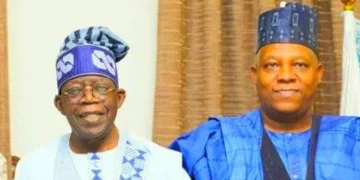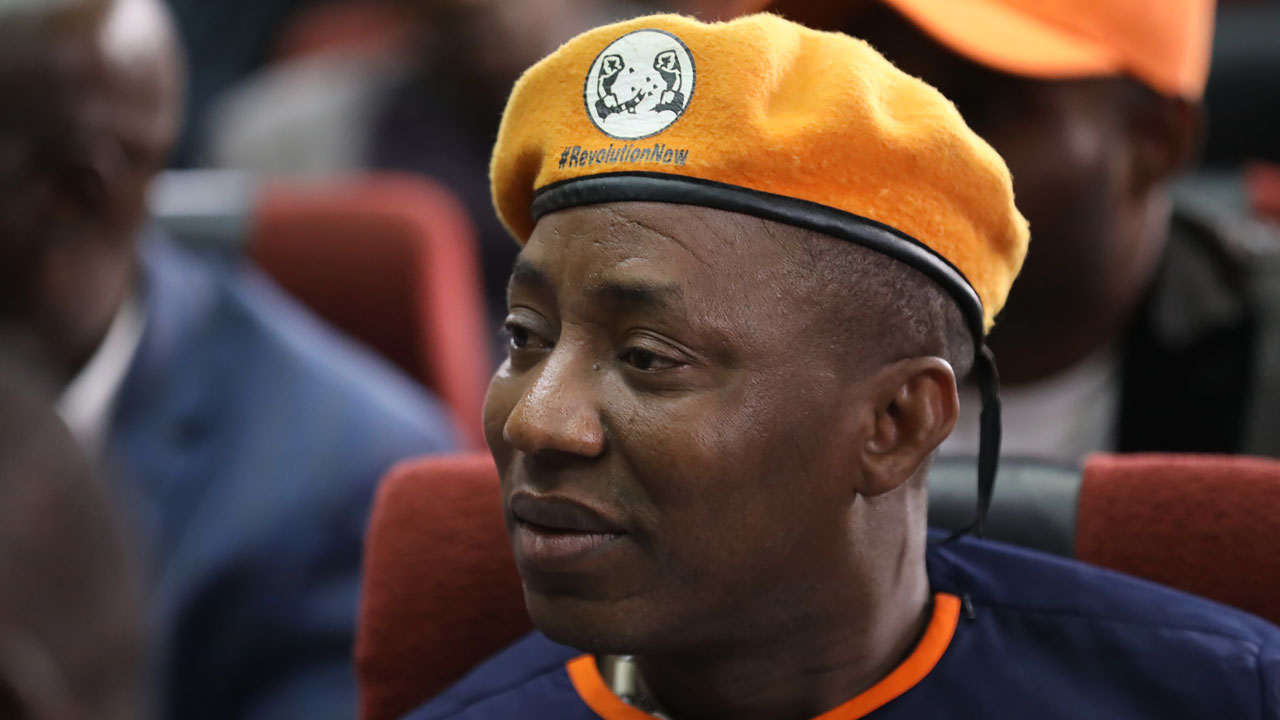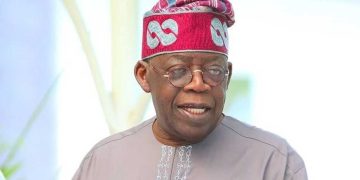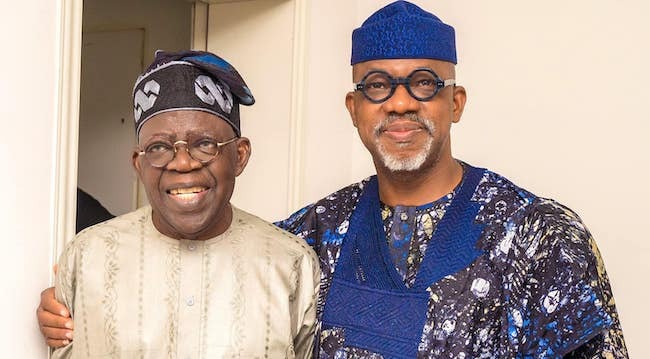In the richly symbolic theatre of Nigerian politics—where every handshake is a pact and every proverb is an indictment—Governor Dapo Abiodun of Ogun State now finds himself canonised, though not in the biblical sense. His canonisation, performed with calculated flourish by President Bola Ahmed Tinubu at the 8th Day Fidau of the late Awujale of Ijebuland, was a rite of reconciliation shrouded in parody. With Yoruba irony rippling through the prayer hall, Tinubu christened Abiodun with two enduring baptisms: “Oyinbo po” and “Okanlomo Eleyi”. These were not terms of endearment—they were subtextual coronations, equal parts satire and scorekeeping.
Let us begin with the first: Oyinbo po. That Tinubu chose this term in such a ceremonial setting was no accident. Translated loosely as “too English,” it was offered not to praise eloquence, but to mock its misplaced pride. Gov. Abiodun is known to be aloof from his constituents. He’s a Logs guy with scan respect for the ordinary folks in his home state. It was an indictment of Abiodun’s perceived detachment from the soil and soul of his people. Where others speak Yoruba at campaign grounds, invoking idioms that stir ancestral pride, Abiodun prefers Oxfordian cadence, crisp diction, and the linguistic aloofness of the dinner-party class. In the Yoruba political lexicon, this is not sophistication—it is sacrilege. The people do not want a governor who sounds like a UN diplomat; they want one who can drop a biting oriki when chaos calls.
If that first christening amused the audience, the second—Okanlomo Eleyi—evoked a different reaction. This phrase, more nuanced, more storied, and infinitely more barbed, was originally hurled by Tinubu with searing contempt during the APC primaries of 2022. Then, Eleyi—“this one”—was shorthand for disloyalty, a public rebuke directed at Abiodun for supporting Yemi Osinbajo over the political patriarch. Repackaged now with Okanlomo—“this one child”—it was a passive-aggressive reconciliation, forgiveness in folklore form, warning in affectionate tones. In Yoruba tradition, parents do not only punish; they perform memory in metaphor. Tinubu, the political patriarch, deployed this mechanism with precision, reminding the faithful: forgiveness may come, but the ledger remains.
And it is precisely in that ledger that Abiodun finds himself ensnared. Since Osinbajo’s failed bid for the presidency, Abiodun’s fortunes in Abuja have waned. Not a single state visit from the President. No federal projects dramatically unveiled. Ministerial appointments from Ogun have mysteriously escaped Abiodun’s fingerprints, curated instead by Tinubu’s own coterie. Even simple optics—like publicly lauding Ogun’s infrastructural strides—have been reserved. It is as though Ogun State sits at a political quarantine, its governor suspended between relevance and recall.
There is, of course, rich irony in all of this. Abiodun was not an outsider to the APC machine. He rose with Tinubu’s initial blessing, campaigned under the party’s banner, benefited from its structures, and yet—at the moment that demanded fealty—turned towards technocratic finesse. His support for Osinbajo wasn’t just a misstep; it was a doctrinal breach. Tinubu, a strategist of mythic proportions, does not forget such heresies. He records them, stores them, and waits for a stage—preferably one sacred, like a monarch’s funeral—on which to deliver judgment dressed as jest.
Yet even amidst this political penance, Abiodun remains inexplicably serene. He smiles through rebukes, applauds his own satire, and tweets compliments to the very hand that stays his invitation. There’s a certain tragic dignity in it, akin to a bishop praying for forgiveness at a mass he wasn’t invited to preach. The real question isn’t whether Abiodun erred; it’s whether he misunderstood the moral structure of Nigerian power.
For Tinubu, power is never about proximity. It is about memory. It is a web of reciprocities stretching decades, reinforced not by party platforms but by shared battles, secret handshakes, and late-night negotiations over amala and allegiances. Abiodun, polished and urbane, entered this ecosystem with spreadsheet logic, calculating his alliances with professional detachment. But Nigeria does not run on spreadsheets. It runs on myth, on rumour, on the sacred economy of gratitude and grievance.
That Tinubu’s rebuke was rendered during the Awujale’s Fidau must be understood beyond timing. Yoruba funerals are spiritual as much as political. They are arenas of power transition, moments when monarchs depart and mortals inherit their moral debts. By choosing this space to issue his satire, Tinubu baptised Abiodun not just before monarchs, but before ancestors. In Yoruba cosmology, the word spoken at the site of mourning carries eternal echo. The President wasn’t just speaking to those gathered—he was speaking to history. Okanlomo Eleyi is now canonised, etched permanently in the mythography of southwestern politics.
The consequences of such canonisation are far-reaching. With succession chatter already brewing in Ogun, Tinubu’s performance could be read as a green light to an alternative heir. There are whispers—vague but persistent—that Tinubu may back another candidate in 2027, one more culturally fluent, more ideologically obedient. Such a move would render Abiodun not a godfather but a ghostfather—a man who once had power but now lacks presence.
This brings us to the matter of post-office survival. If Abiodun plans to stay politically relevant beyond his tenure, two paths remain. The first is slow rehabilitation: a recommitment to Tinubu’s machinery, a public mea culpa wrapped in development projects and party loyalty. But such a journey requires more than apology. It requires re-submersion into Yoruba political rites—a willingness to eat the food, speak the proverbs, attend the weddings, and show up without invitation. It requires abandoning the diplomat’s posture for the chieftain’s swagger.
The second path is rebellion. Abiodun could join the growing coalition of displaced titans: Atiku, Peter Obi, El-Rufai, and the rest of the ADC’s grand conclave. This faction—still fluid, still experimental—is pitching itself as the antidote to Tinubu’s dominance. For Abiodun, this would mean escape from marginalisation, an entry into a new narrative. But it would also mean surrendering any claim to Yoruba mainstream politics, which remains firmly under Tinubu’s control. It would be a declaration of exile—not from the party, but from its culture.
Philosophically, what Tinubu has done with Abiodun is remind us that power in Nigeria is still oral, still ancestral, still governed by the morality of memory. There are no true pardons—only performances of reconciliation. Names like Oyinbo po and Okanlomo Eleyi are not labels; they are fables, designed to teach governors and guide successors. They represent a kind of political jurisprudence, where the judgment is laughter and the sentence is symbolism.
For Abiodun, this should inspire reflection. His polish, his grammar, and his technocratic leanings are not inherently wrong. But in a system where language connects lineage, detachment invites danger. Leaders who do not speak the dialect of their people will often find themselves translated into irrelevance. The governor’s challenge now is not to regain Tinubu’s favour. That may come or not. The challenge is to regain narrative traction—among monarchs, markets, and margins. Because in Nigeria, once your name becomes a proverb, the people stop voting for you and start quoting you.
And what of Tinubu? His canonisation of Abiodun wasn’t merely satire. It was a sermon. The President used the Awujale’s passing as an occasion to rewrite political folklore, to teach younger politicians the value of loyalty, and to remind observers that forgiveness without recollection is foreign to Yoruba political theology. Eleyi may be accepted, but he will never be forgotten.
So, as Ogun prepares for its next act and as Abiodun navigates the twilight of his tenure, the stage remains set. Will he reinvent himself within Tinubu’s orbit, speaking less like a diplomat and more like an omoluabi? Or will he embrace opposition, baptised now as a dissident by default? Whatever path he chooses, one thing remains true: Okanlomo Eleyi is no longer just a governor. He is a fable. And in Nigeria, fables do not govern—they warn.

Folami David is a dynamic journalist who views the world through an analytical lens, translating complex narratives across multiple industries into compelling stories. With an insatiable appetite for information and a keen eye for emerging trends, Folami specializes in uncovering the interconnections between technology, business, culture, and society.


















